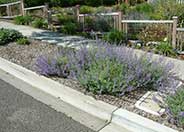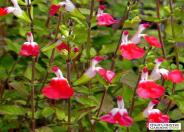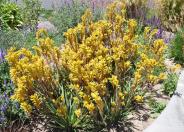
Common name:Catmint
Botanical name:Nepeta X faassenii
Nepeta faassenii makes soft, gray green, undulating mounds that are 1.5' high when blooming. The small leaves are attractive to cats. This perennial has lavender blue flowers in late spring and early summer.

Common name:Superba Fescue
Botanical name:Festuca amethystina 'Superba'
The Rainbow Fescue is a hardy fescue with fine, blue green foliage that grows 8" tall. It has spring flowers that are 12" above the foliage. This fescue is a very showy, neat grass for sunny spots during spring and fall. The Rainbow Fescue is drought tolerant. -Cornflower Farms

Common name:Hot Lips Sage
Botanical name:Salvia 'Hot Lips'
Hot Lips Littleleaf Sage (Salvia microphylla 'Hot Lips') is a long-blooming Sage that blooms all summer with eye-catching red and white bicolor flowers. The nectar-rich flowers attract hummingbirds and other pollinators. Hot Lips Littleleaf Sage (Salvia microphylla 'Hot Lips') has distinctive, brilliantly colored flowers that make 'Hot Lips' Salvia a special selection. Blooming from spring until hard frost in fall, the flower color will vary seasonally. In the cooler times of spring and fall, the flowers are strongly bi-colored red and white. When it's hot, the flowers go solid red. Regardless of the time of the growing season, this ever-blooming selection is a beauty. The plant makes a small shrub with age and thrives in poor soils with plenty of heat and sun. Plant with Lavender (Lavandula) and white Appleblossom Grass (Gaura). Javelina resistant

Common name:Bush Gold Kangaroo Paw
Botanical name:Anigozanthos flavidus 'Bush Gold'
This evergreen perennial forms clumps with foliage reaching 2' high. From spring through summer emerge the bright yellow tubular flower buds that flare open at tips like a paw, about 3' tall. This plant prefers full sun in well draining soil. Fertilize only in spring.
Designer:
Photographer: Vicki Anderson
Physical weed control, including mulching, or hand removal protects the watershed from harmful chemicals.
Attract, or buy beneficial insects such as ladybugs and lacewings to control pest outbreaks in your garden.